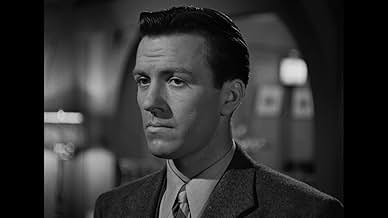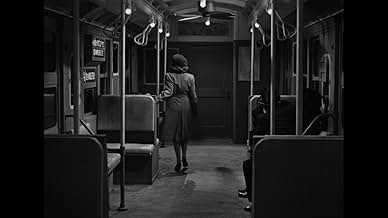AVALIAÇÃO DA IMDb
6,7/10
8,4 mil
SUA AVALIAÇÃO
Uma mulher em busca de sua irmã desaparecida descobre um culto satânico no Greenwich Village de Nova York.Uma mulher em busca de sua irmã desaparecida descobre um culto satânico no Greenwich Village de Nova York.Uma mulher em busca de sua irmã desaparecida descobre um culto satânico no Greenwich Village de Nova York.
- Prêmios
- 4 indicações no total
Joan Barclay
- Gladys
- (não creditado)
Patti Brill
- Minor Role
- (não creditado)
Wally Brown
- Durk
- (não creditado)
Feodor Chaliapin Jr.
- Leo
- (não creditado)
Wheaton Chambers
- Missing Girl's Father
- (não creditado)
James Conaty
- Party Guest
- (não creditado)
Edith Conrad
- Minor Role
- (não creditado)
Kernan Cripps
- Police Officer Danny
- (não creditado)
- Direção
- Roteiristas
- Elenco e equipe completos
- Produção, bilheteria e muito mais no IMDbPro
Avaliações em destaque
As a longtime booster of The Cat People, I tended to give the credit to its director Jacques Tourneur (later to helm Out of the Past). Seeing The Seventh Victim, also from Val Lewton's B-movie unit at RKO, changed all that. It seems Lewton was the resident genius, cobbling together stylish horror/suspense films on shoestring budgets. The young Kim Hunter, away at a private school, learns that her tuition hasn't been paid because her sister, owner of a beauty empire, has disappeared. She leaves school and starts scouring New York's Greenwich Village (also the locale of much of The Cat People) only to uncover a cult of devil worshipers. Lewton's thrillers haven't dated the way James Whale's, for instance, have, possibly because they depend so heavily on suggestion; the literalness of today's "horror" films is completely alien to these suggestive, truly chilling films. The RKO B-movie unit under Lewton was also, probably, a major influence on the look of film noir, soon to become the cutting-edge aesthetic in American movies. This is as tense and satisfying a 75 minutes as you'll find until the Mann/Alton team's seminal noirs of a few years later.
What "The 7th Victim" has going for it is its uniqueness. It certainly is unlike any film from that era that I remember seeing.
This is one of those films that it helps to know nothing about before viewing. To read any sort of capsule about the flick would definitely take away from the enjoyment of the film.
Having said that, I am not totally satisfied with the payoffs the movie provides. There are too many gaps in logic, combined with a bit too much moralizing. Some people find themselves in situations in this film that just simply seem to lack any credibility.
For some fascinating sequences (most notably, one that takes place in a shower and seems to have been seen by Alfred Hitchcock) this film is definitely worth a look-see.
For me, the individual elements of the film was far more interesting than the sum of its parts.
This is one of those films that it helps to know nothing about before viewing. To read any sort of capsule about the flick would definitely take away from the enjoyment of the film.
Having said that, I am not totally satisfied with the payoffs the movie provides. There are too many gaps in logic, combined with a bit too much moralizing. Some people find themselves in situations in this film that just simply seem to lack any credibility.
For some fascinating sequences (most notably, one that takes place in a shower and seems to have been seen by Alfred Hitchcock) this film is definitely worth a look-see.
For me, the individual elements of the film was far more interesting than the sum of its parts.
This little known and scantily screened Val Lewton masterpiece is a must see. The eerie atmosphere established at the boarding school where Kim Hunter learns of her sister's disappearance continues throughout. Scenes including her nightmarish experience in a darkened cosmetic company hallway illustrate how far afield recent film has gotten from true suspense as sustained in the imagination of the viewer. The chilling normalcy of the lives of the Satanists she comes to be pursuing in an effort to understand what has happened to her sister, and their quiet menace as they later gather forces to will the suicide of one of their ranks is gripping. The scenes depicting her sister's frantic run through the streets to escape a pursuer will remind others of the opening of Lewton's other little shown film The Leopard Man. Viewing this film further reinforces my belief that an intelligent film patron does not need to be clubbed over the head by excessive gore and violence to be truly scared by a film if the story is intriguing and the execution is as good as in The Seventh Victim.
Schoolgirl Kim Hunter (Mary) is called to the office of the Headmistress Ottola Nesmith and told that she can no longer stay on as a pupil as her sister Jean Brooks (Jacqueline) has stopped paying her fees. More than that, Brooks seems to have gone missing. So, Hunter goes off to find her. But Brooks isn't so easy to locate.
This film leaves you with scenes stuck in your mind, so it's good from that perspective. It is also well shot with an eerie atmosphere. Scenes that stand out include the sequence with Hunter and a detective exploring an office at night and the subsequent spooky train ride, a shower scene that will make you think of "Psycho" (1960) and pretty much every scene with Brooks. Fancy a drink? – no thanks but the pressure is on. And how about that ending? Wow, pretty bleak stuff. Especially coming after what had me cringing as we watched God and the Bible being used as a tool to counter Satan and his ways in an extremely simplistic way.
Amo, Amas, Amat, Amamus, Amatis, Amant – remember your Latin from school? The 'ablative absolute' and the 'ut' clause (use the subjunctive). Quamquam. This film also throws in some Latin and I'm glad to hear it. It takes the viewer back to a time sadly long gone as we hear schoolgirls reciting the verb 'Amo' – to love. The day will come when a generation will watch this film and not understand what language it is.
The cast are OK with Jean Brooks standing out. Her look suggests she is leader of the occult movement rather than a victim of it. And all of her scenes are quality – some genuinely scary, and all unworldly because of her appearance. That ending with the neighbour comes as a shock and leaves an eerie memory that will have you thinking about how we view life. It's an interesting film and sad.
This film leaves you with scenes stuck in your mind, so it's good from that perspective. It is also well shot with an eerie atmosphere. Scenes that stand out include the sequence with Hunter and a detective exploring an office at night and the subsequent spooky train ride, a shower scene that will make you think of "Psycho" (1960) and pretty much every scene with Brooks. Fancy a drink? – no thanks but the pressure is on. And how about that ending? Wow, pretty bleak stuff. Especially coming after what had me cringing as we watched God and the Bible being used as a tool to counter Satan and his ways in an extremely simplistic way.
Amo, Amas, Amat, Amamus, Amatis, Amant – remember your Latin from school? The 'ablative absolute' and the 'ut' clause (use the subjunctive). Quamquam. This film also throws in some Latin and I'm glad to hear it. It takes the viewer back to a time sadly long gone as we hear schoolgirls reciting the verb 'Amo' – to love. The day will come when a generation will watch this film and not understand what language it is.
The cast are OK with Jean Brooks standing out. Her look suggests she is leader of the occult movement rather than a victim of it. And all of her scenes are quality – some genuinely scary, and all unworldly because of her appearance. That ending with the neighbour comes as a shock and leaves an eerie memory that will have you thinking about how we view life. It's an interesting film and sad.
THE SEVENTH VICTIM is one of the best films produced by Val Lewton, famous for his wartime series of low budgeted, but brillantly spooky thrillers. A young girl (Kim Hunter) tries to locate her missing sister in Manhattan. In doing so, she uncovers a witch coven. There are so many masterful moments in this classic. In one scene, she is stalked by top-hatted cultists in a deserted subway, in another scene, as she showers, a female cultist confronts her (Shades of PSYCHO?) and there are terrific shocks as an exiled cultist tries to escape the coven. A must for horror fans!
Você sabia?
- CuriosidadesErford Gage, who played the poet Jason Hoag, enlisted in the U.S. Army in August 1943 (around the time this film was released) and was killed in action in the Phillipines in March 1945.
- Erros de gravaçãoThe opening text reads: "I run from death, and death meets me as fast, And all my pleasures are like yesterday." The movie attributes the quote to John Donne's Holy Sonnet #7. But it is actually from Holy Sonnet #1.
- Cenas durante ou pós-créditos[title after starting credits] I runne to death, and death meets me as fast, and all my pleasures are like yesterday. Holy sonnet #VII Jonne Donne
- Versões alternativasExists in a computer-colorized version
- ConexõesFeatured in Aweful Movies with Deadly Earnest: The Seventh Victim (1967)
- Trilhas sonorasMay Heaven Forgive You
(uncredited)
From "Martha"
Music by Friedrich von Flotow
Arranged by Roy Webb
[The tune playing on the barrel organ as Mary goes to the Dante for the first time]
Principais escolhas
Faça login para avaliar e ver a lista de recomendações personalizadas
Detalhes
- Data de lançamento
- País de origem
- Idiomas
- Também conhecido como
- La séptima víctima
- Locações de filme
- Empresa de produção
- Consulte mais créditos da empresa na IMDbPro
- Tempo de duração1 hora 11 minutos
- Cor
- Proporção
- 1.37 : 1
Contribua para esta página
Sugerir uma alteração ou adicionar conteúdo ausente

Principal brecha
By what name was A Sétima Vítima (1943) officially released in India in English?
Responda

































